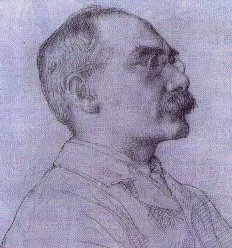|
|
Biography
Rudyard Kipling was born in Bombay,India on December 30,1865, in the J. J. School of Arts, of which, his father,
Lockwood Kipling, was then head. At the age of six, he was left in a foster home in England. He was extremely
unhappy at his foster home, but stayed there until 1878, when he entered a boarding school in England.
His later writings indicate that he was happy at school, where he started writing. He returned to India
in 1882 and joined his parents in Lahore where he worked as a journalist with Civil and Military Gazette.
In 1887 he joined The Pioneer in Allahabad as an assistant editor and overseas correspondent. Before
he went back to England and settled in London in 1889, he had already become famous for his verses
and satirical writings such as Plain Tales from the Hills (1888) and Soldiers Three (1892).
By the last decade of the nineteenth century Rudyard Kipling had become enormously successful as
a poet and writer, and was seen as a successor to Charles Dickens. He married Caroline Starr Balestier
in 1892. His two novels, The Jungle Book (1894-5) have now become widely translated classics.
His other novels include Kim (1901) and Just So Stories (1902). He received the Nobel Prize
for literature in 1907.
Rudyard Kipling died on January 18, 1936 in London. He was buried in the Poet's Corner at Westminster Abbey.
His autobiography Something of Myself appeared in 1937.
|
Biographie
Kipling, Rudyard (1865-1936), écrivain britannique. Kipling, fils du conservateur du musée de Lahore,
naquit le 30 décembre 1865 à Bombay, en Inde. À l'âge de six ans, il fut envoyé en pension en Angleterre
pour recevoir une éducation britannique. Il y vécut cinq années malheureuses, qu'il évoqua plus tard
dans Stalky et Cie (1899) et dans la Lumière qui s'éteint (1891).
En 1882, il retourna en Inde où, jusqu'en 1889, il se consacra à l'écriture de nouvelles pour
la Civil and Military Gazette de Lahore. Il publia ensuite Chants des divers services (1886),
des poèmes satiriques sur la vie dans les baraquements civils et militaires de l'Inde coloniale,
et Simples Contes des collines (1887) un recueil de ses nouvelles parues dans divers magazines.
C'est par six autres récits, consacrés à la vie des Anglais en Inde et publiés entre 1888 et 1889,
que Kipling se fit connaître.
Kipling fit après cette période de longs voyages en Asie et aux États-Unis, où il épousa Caroline Balestier,
en 1892, et où il écrivit le Livre de la jungle (1894). Il vécut pendant une courte période dans le Vermont,
puis, en 1903, s'installa définitivement en Angleterre. De ses nombreuses oeuvres, beaucoup devinrent
très populaires.
Rudyard Kipling fut le premier écrivain anglais à recevoir le prix Nobel de littérature (1907).
Il mourut le 18 janvier 1936, à Londres.
|
|---|



